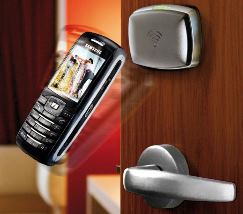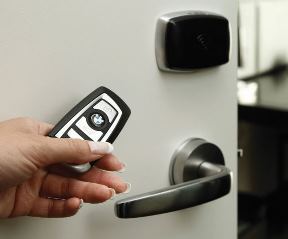|
August 2013
Article
AutomatedBuildings.com
|
[an error occurred while processing this directive]
(Click
Message to Learn More)
|
|
Security Technology Plays Central Role In
Hotel Automation
Comprised of wireless digital
thermostats, occupancy sensors, door position interfaces, remote server
software and a comprehensive dashboard reporting interface, these
integrated solutions help avoid unnecessary energy consumption without
disrupting guest comfort.
|
|
Contemporary hotel
guests tend to be travelers tethered to tablets and
smartphones, and these tech-savvy consumers desire a hospitality
experience that centers on connection, convenience and comfort.
Automation is a theme from initial booking to check-out, and hotel
locking manufacturers are playing a central role in making the
streamlined hotel stay a reality. It is easier for guests to engage in
automated self-service than to wait in a long queue to interact with
hotel staff at the front desk. Moreover, from the perspective of
hoteliers, building automation in the form of communicative locking
platforms and integrated room management systems are making hospitality
far more efficient and cost-effective than ever before.
Hotel
locking vendors have begun deploying integrated energy management
systems that interface with guestroom locks and central room monitoring
systems, creating a centerpiece of hotel automation that is saving not
just energy but also a tremendous amount of money for hotels in the
form of increased efficiency. Comprised of wireless digital
thermostats, occupancy sensors, door position interfaces, remote server
software and a comprehensive dashboard reporting interface, these
integrated solutions help avoid unnecessary energy consumption without
disrupting guest comfort. Some of the more advanced solutions
automatically assume control of ambient temperature when guestrooms are
unoccupied, never allowing them to become either too warm or too cold;
upon guests' return, the system automatically resumes the preset
temperature settings. They can also interface with the hotel's property
management system to pre-condition the room upon guest check-in and
automatically engage enhanced energy savings mode upon check-out.
 Advances
in mobility, along with communications protocols like RFID and
NFC, are helping hotel locking systems themselves become largely
automated. Today's hotel locking systems can simplify the key
administration process by automating the distribution and termination
of access privileges, including cloud-based solutions that can deliver
access encoding even before arrival, meaning that guests can gain entry
to their rooms without even needing to check in at the front desk. The
last thing travelers want to do after a long flight is to stand in line
at check-in, so these types of innovations mean a more leisurely and
pleasant arrival experience for guests. Hardware add-ons for tablet
computers enable guestroom keycards to be encoded and activated from
anywhere, whether from a lounge chair in the hotel lobby or in shuttle
en route from the airport.
Advances
in mobility, along with communications protocols like RFID and
NFC, are helping hotel locking systems themselves become largely
automated. Today's hotel locking systems can simplify the key
administration process by automating the distribution and termination
of access privileges, including cloud-based solutions that can deliver
access encoding even before arrival, meaning that guests can gain entry
to their rooms without even needing to check in at the front desk. The
last thing travelers want to do after a long flight is to stand in line
at check-in, so these types of innovations mean a more leisurely and
pleasant arrival experience for guests. Hardware add-ons for tablet
computers enable guestroom keycards to be encoded and activated from
anywhere, whether from a lounge chair in the hotel lobby or in shuttle
en route from the airport.
Some
hotel companies have begun turning loyalty cards into renewable
room keycards using RFID. Guests skip the front desk queue by receiving
their room number via text and proceeding straight to the room, where
the electronic RFID lock automatically recognizes the loyalty card and
grants entry. Despite limited marketing of it, the concept has proven
tremendously popular, with one brand already boasting 10,000 registered
users.
One
of the most exciting advances in hotel automation technology
centers on Near Field Communication, or NFC. Mobile devices with NFC
are beginning to flood the market and will become commonplace over the
next few years. With NFC, guests can receive digital room keys straight
to their enabled mobile device, sent over the air and held securely in
dedicated, encrypted applets. Guests can access their rooms by simply
touching their device to the NFC-compatible keycard reader.
Those
consumers who have already had a chance to use NFC digital hotel
keys in a real-world setting really seem to love it. A hotel that
recently piloted the technology surveyed participating guests and found
that almost all said they would take advantage of the technology again
if it were available. Most said the service enhanced the enjoyment of
their stays, and every single one expressed appreciation at not having
to wait in a check-in queue. More than half said the self-service
offering shaved at least 10 minutes off the normal check-in process.
While
we cannot say precisely when NFC will achieve critical mass among
consumers, hotels being built or undergoing renovations today need not
wait to install this technology. Hoteliers can select electronic
locking systems that are dually compatible with both RFID and NFC,
meaning guests tech savvy and not can both feel comfortable running the
same hardware—and these systems come at a reasonable price point that
makes them feasible options for even select-service and midscale
properties.
[an error occurred while processing this directive]The
automation capabilities of NFC and RFID locking systems boast
security advantages over physical keys and magnetic keycards, as well.
The best solutions include features that prevent unauthorized use of
lost or stolen mobile devices to access rooms, allowing hotel managers
to instantly and remotely add, remove or update access rights for any
users—regardless of whether the door locks are online or offline. Some
of these solutions interface with central property management systems
and servers, enabling the reviewing of remote audit trails. Text
messages and emails can be automatically sent to hotel managers
whenever a designated event occurs.
Software integrates with the hotel's property management system,
employing RF-online communication to eliminate the need for property
managers to travel to and from guestrooms to perform tasks like
reprogramming individual locks and identifying or changing low
batteries. Because such systems can communicate remotely with
individual locks in real time, they provide a significant extra layer
of security. In the event of a lost or stolen keycard, access
privileges for that card can be immediately revoked, preventing
unauthorized individuals from gaining access to guestrooms.
 Automation
and digital locking systems are even changing the way we
book hotels in the first place. Automakers have begun beta-testing
integrations to vehicle navigation systems that allow drivers to
conduct voice-command searches for available hotels nearby, and then
interface with the selected hotel’s property management system to
reserve a room. Once the reservation is booked, the navigation systems
guide the driver to the hotel and communicate the assigned guestroom
number. Upon arrival at the property, the guest can proceed straight to
the room. The guest’s NFC-equipped car key wirelessly receives an
access code for the guestroom lock, allowing the car key to double as a
hotel room key.
Automation
and digital locking systems are even changing the way we
book hotels in the first place. Automakers have begun beta-testing
integrations to vehicle navigation systems that allow drivers to
conduct voice-command searches for available hotels nearby, and then
interface with the selected hotel’s property management system to
reserve a room. Once the reservation is booked, the navigation systems
guide the driver to the hotel and communicate the assigned guestroom
number. Upon arrival at the property, the guest can proceed straight to
the room. The guest’s NFC-equipped car key wirelessly receives an
access code for the guestroom lock, allowing the car key to double as a
hotel room key.
Complementing
the theme of hotel automation is the evolution of a
minimalist aesthetic made possible by advances in RFID and NFC locking
systems. No longer must guestroom doors be cluttered by unsightly lock
hardware components, as all electronic components can now be hidden
inside the door itself to make the access devices practically invisible
to guests.
With
these rapid advances in technology, the simple hotel lock of
yesterday continues to evolve into a core component of building
automation that is designed to ensure both security and guest
convenience for the future.
footer
[an error occurred while processing this directive]
[Click Banner To Learn More]
[Home Page] [The
Automator] [About] [Subscribe
] [Contact
Us]